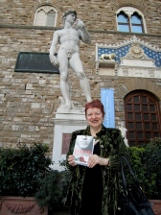Mary Hoffman, guest blogger

It is a thrill to have Mary
Hoffman, author of the new historical book David, as
the ReadPlus guest blogger. I loved her Stravaganza sequence and Stravaganza:
City of Secrets was nominated for the Carnegie Medal. Troubadour
was another favourite and it was nominated for the 2010 Carnegie
Medal and shortlisted for the Costa Book Award. The
Falconer's Knot was shortlisted for the Guardian Fiction Award
and winner of the French Prix Polar Jeunesse 2009.
Here is a thought provoking article from Mary on versatility:
Michelangelo was immensely versatile - a sculptor, painter and
architect - he even wrote poetry! That was not considered so unusual
in Renaissance Florence, where Lorenzo de'Medici, Michelangelo's
patron, known as 'the Magnificent,' had set the bar pretty high.
More importantly, the arts as we know them had not separated out
into the distinctive disciplines we recognise today. Indeed the
terms 'artist' and 'work of art' had not been invented. Leonardo da
Vinci was another versatile man of what we now call 'genius,' who
might be engaged on a painting one day and designing fortifications
the next.
The more specialised the separate branches of the arts have become,
the less likely is it that anyone will excel in more than one. I've
tried to think of twenty-first century examples and failed. But in
the nineteenth and twentieth centuries they were not so unusual:
William Morris was a writer, painter and designer; John Ruskin a
critic and an artist too; David Jones a poet and painter; Wyndham
Lewis a painter and novelist; Mervyn Peake an artist as well as a
fantasy writer. Just a handful of names and all male, but it's hard
to think of anyone so versatile across the arts today. (Oh, but
Philip Pullman and J.K.Rowling can both draw - rather well).
At some point in the history of European culture, and specifically
British culture, a mistrust of too much versatility crept in: a
horror of dilettantism, leading to that most ungenerous of
appellations - 'Jack-of-all-trades, master of none'. We are supposed
to learn how to do one thing and stick at it. Hence the focus on
'specialising' in schools by taking 3 or 4 A levels, as opposed to
the European system of the Baccalaureat.
Would a Michelangelo or Leonardo be welcome among us today? Or would
he or she suffer from 'Tall Poppy Syndrome' - a desire by other
people to cut the outstanding down to the same size as everyone
else? I remember this happening to Kenneth Branagh, the actor, when
he started his own theatre company as director and dared to write
his autobiography in his twenties.
Even within the small cultural subsection that is children's
literature, I have noticed a mistrust of those who don't stick to
one genre or age-group. They often have to use pseudonyms,
especially if they are prolific. Whereas my heroine and role-model
is Margaret Mahy, a writer who excels in picture books, junior
fiction and wonderful teenage novels like The Changeover and is as
at home in poetry as prose. Dammit, she even wrote a reading scheme
and made it funny and memorable!
I interviewed her once and praised her for her versatility. She said
that if she was lucky, when she had an idea, it brought with it a
sense of the length and genre that it would fit into - a marvellous
answer.
I think versatility will make a come back; it's no good being a
one-trick pony in a recession. People will have to turn their hands
to lots of things and the world might end up being a better place
for it.
Mary Hoffman
You can find Mary at the following places:
Website:
http://www.maryhoffman.co.uk
Twitter: http://www.twitter.com/@MARYMHOFFMAN
Facebook: http://www.facebook.com/maryhoffman.fanpage
Blog: http://www.bookmavenmary.blogspot.com
Pat Pledger (Editor)